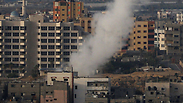
'One rocket which hits an Israeli population center will be enough to completely change the picture'
צילום: AFP
It's time for a ceasefire
Op-ed: If Israel's strategic purpose was to create deterrence, it seems to have achieved it at a minimal cost and should settle for that. The longer the battle, the bigger the chance for difficult, unexpected incidents.
Hamas has forced a conflict on Israel against Israel's will, but it may already be regretting it.
When the IDF launched Operation Protective Edge, the state's leaders did not inform the public about its targets. A possible definition of targets for an operation can be as follows, from the easiest to the hardest: Defending the state's residents; creating deterrence; seriously damaging Hamas' abilities; destroying Hamas.
Assuming that Israel's strategic purpose was to create deterrence, it seems to have achieved it (at a minimal cost), and the right thing to do in the coming days would be to stop the battle.
If Hamas accepts an Israeli ceasefire proposal, under our conditions, it means that it has indeed been deterred. If the Israeli proposal is turned down, Israel will fill its legitimacy batteries in a way allowing it to considerably expand the operation's goals and volume.
When Israel was forced into a war in a similar manner in 2006, the government decided to deal Hezbollah a serious blow in order to create a lasting deterrence effect. This decision was supported by broad international legitimacy which Israel enjoyed in the first week of fighting.
In retrospect, had Israel stopped the IDF after the first week, during which the long-range missiles and most of the Beirut's Dahiya Quarter were destroyed, the war would have been perceived, even then, as a great success.
The situation with Hamas today is similar. While Israel enjoys broad legitimacy at home and in the world, and has the upper hand militarily, Hamas has suffered serious blows since the start of the current round of fighting and has failed in almost every move it has carried out. All its "surprises" have been thwarted so far.
The Air Force is striking in Gaza with a force which is 1,000 times stronger than the explosives Hamas is firing at Israel. The extent of the airstrikes is much bigger than the strikes during Operation Pillar of Defense.
Nonetheless, the longer the battle, the bigger the chance for difficult and unexpected incidents, and so the right thing to do is to settle for the deterrence achievement, if it indeed has been achieved.
In the current situation, Hamas' military effort is portrayed as helplessness against the IDF's defensive and offensive abilities, and especially against the overwhelming efficiency of the Iron Dome system. However, one rocket which hits an Israeli population center will be enough to completely change the picture.
If Hamas turns down a ceasefire or violates it after a short period of time, it will make it easier for Israel to expand the operation's targets, deepen the damage caused to Hamas and use surprises and other abilities which have been missing this time from the IDF toolbox.
Since the new regime in Egypt took over and removed of the Muslim Brotherhood from the government, Hamas has been left without any Egyptian support, finding itself as an enemy to the Cairo regime, which sees it as a key threat. Most of the smuggling tunnels along the Philadelphi Route have been blocked, seriously affecting Hamas' armament and funding abilities. Most of the rockets fired at Israel today come from local Gazan production.
Therefore, if Hamas rejects a ceasefire, the right thing to do would be to direct the Israeli military effort at finding creative ways to inflict serious and ongoing damage on Hamas' abilities, the current and the future ones (and not just to influence its intentions). Such a move will necessarily lead to a longer period of calm after the operation ends.
Major-General (res.) Amos Yadlin is the director of Tel Aviv University’s Institute for National Security Studies (INSS). He served as the IDF’s chief of Defense Intelligence from 2006 to 2010.










